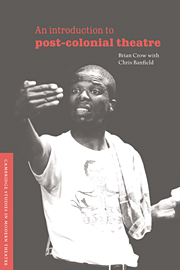Book contents
- Frontmatter
- Contents
- Preface
- Acknowledgements
- Introduction
- 1 Derek Walcott and a Caribbean theatre of revelation
- 2 August Wilson's theatre of the blues
- 3 Jack Davis and the drama of Aboriginal history
- 4 Wole Soyinka and the Nigerian theatre of ritual vision
- 5 Athol Fugard and the South African ‘workshop’ play
- 6 Badal Sircar's Third Theatre of Calcutta
- 7 Girish Karnad and an Indian theatre of roots
- Conclusion
- Further reading list
- Index
4 - Wole Soyinka and the Nigerian theatre of ritual vision
Published online by Cambridge University Press: 26 February 2010
- Frontmatter
- Contents
- Preface
- Acknowledgements
- Introduction
- 1 Derek Walcott and a Caribbean theatre of revelation
- 2 August Wilson's theatre of the blues
- 3 Jack Davis and the drama of Aboriginal history
- 4 Wole Soyinka and the Nigerian theatre of ritual vision
- 5 Athol Fugard and the South African ‘workshop’ play
- 6 Badal Sircar's Third Theatre of Calcutta
- 7 Girish Karnad and an Indian theatre of roots
- Conclusion
- Further reading list
- Index
Summary
Since receiving their independence in the 1950s and early 1960s, the countries of sub-Saharan Africa have earned an unenviable reputation as a collective continental basket-case. The crisis in Rwanda, which is occurring as this is written, is only the latest and, sadly, the greatest in a long succession that now includes innumerable civil wars, large-scale social strife, catastrophes such as famine and drought, disease on an epidemic scale, and, as a constant backdrop, apparently unvanquishable economic stagnation and political instability and oppression.
The reasons for, and consequences of, African ‘backwardness’ are complex and debatable, but few, surely, would now dissent from the view that Africa's colonial past continues to be a determining factor in the ills that beset it in the present. For it is evident enough that, whatever the failings for which African governments and ruling elites are largely or exclusively responsible, the disruption of African history by the European imperial powers has created a range of political, economic and cultural problems of enormous magnitude. Borders were artificially imposed, nations created and named by imperial fiat. Peoples of different language and culture, often knowing – or wishing to know – little or nothing of each other, were forcibly yoked together and, when it was decided in distant capitals that the winds of change were blowing in a direction that pointed to political independence, were expected henceforth to behave as if they had organically evolved as liberal capitalist democracies.
- Type
- Chapter
- Information
- An Introduction to Post-Colonial Theatre , pp. 78 - 95Publisher: Cambridge University PressPrint publication year: 1996
- 1
- Cited by



